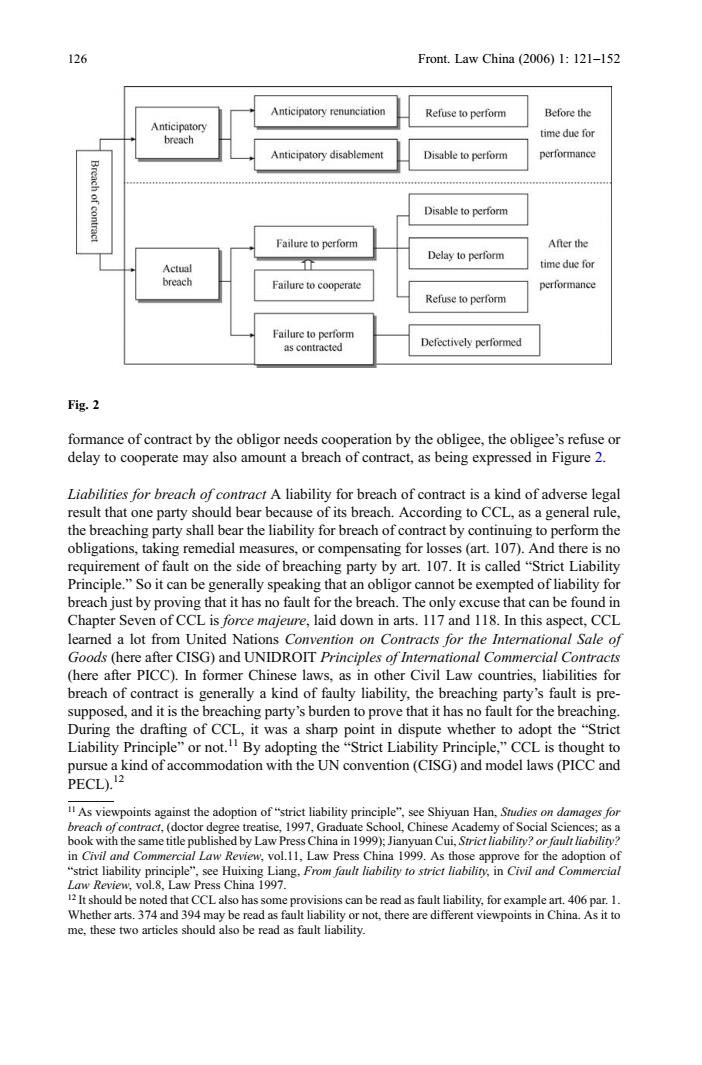正在加载图片...

126 Front.Law China(2006)1:121-152 Anticipatory renunciation Refuse to perform Before the Anticipatory time due for breach Anticipatory disablement Disable to perform performance Breach of contract Disable to perform Failure to perform After the Delay to perform Actual time due for breach Failure to cooperate performance Refuse to perform Failure to perform as contracted Defectively performed Fig.2 formance of contract by the obligor needs cooperation by the obligee,the obligee's refuse or delay to cooperate may also amount a breach of contract,as being expressed in Figure 2. Liabilities for breach of contract A liability for breach of contract is a kind of adverse legal result that one party should bear because of its breach.According to CCL,as a general rule, the breaching party shall bear the liability for breach of contract by continuing to perform the obligations,taking remedial measures,or compensating for losses(art.107).And there is no requirement of fault on the side of breaching party by art.107.It is called"Strict Liability Principle."So it can be generally speaking that an obligor cannot be exempted of liability for breach just by proving that it has no fault for the breach.The only excuse that can be found in Chapter Seven of CCL is force majeure,laid down in arts.117 and 118.In this aspect,CCL learned a lot from United Nations Convention on Contracts for the International Sale of Goods (here after CISG)and UNIDROIT Principles of International Commercial Contracts (here after PICC).In former Chinese laws,as in other Civil Law countries,liabilities for breach of contract is generally a kind of faulty liability,the breaching party's fault is pre- supposed,and it is the breaching party's burden to prove that it has no fault for the breaching. During the drafting of CCL,it was a sharp point in dispute whether to adopt the "Strict Liability Principle"or not.By adopting the "Strict Liability Principle,"CCL is thought to pursue a kind of accommodation with the UN convention(CISG)and model laws(PICC and PECL).12 As viewpoints against the adoption of"strict liability principle",see Shiyuan Han,Sudies on damages for breach ofcontract,(doctor degree treatise,1997.Graduate School,Chinese Academy of Social Sciences;as a book with the same title published by Law Press China in 1999);Jianyuan Cui,Strict liability?or fault liability? in Civil and Commercial Law Review,vol.11,Law Press China 1999.As those approve for the adoption of "strict liability principle".see Huixing Liang,From fault liability to strict liability,in Civil and Commercial Law Review,vol.8,Law Press China 1997. 12It should be noted that CCL also has some provisions can be read as fault liability,for example art.406 par.1. Whether arts.374 and 394 may be read as fault liability or not,there are different viewpoints in China.As it to me,these two articles should also be read as fault liability.formance of contract by the obligor needs cooperation by the obligee, the obligee’s refuse or delay to cooperate may also amount a breach of contract, as being expressed in Figure 2. Liabilities for breach of contract A liability for breach of contract is a kind of adverse legal result that one party should bear because of its breach. According to CCL, as a general rule, the breaching party shall bear the liability for breach of contract by continuing to perform the obligations, taking remedial measures, or compensating for losses (art. 107). And there is no requirement of fault on the side of breaching party by art. 107. It is called “Strict Liability Principle.” So it can be generally speaking that an obligor cannot be exempted of liability for breach just by proving that it has no fault for the breach. The only excuse that can be found in Chapter Seven of CCL is force majeure, laid down in arts. 117 and 118. In this aspect, CCL learned a lot from United Nations Convention on Contracts for the International Sale of Goods (here after CISG) and UNIDROIT Principles of International Commercial Contracts (here after PICC). In former Chinese laws, as in other Civil Law countries, liabilities for breach of contract is generally a kind of faulty liability, the breaching party’s fault is presupposed, and it is the breaching party’s burden to prove that it has no fault for the breaching. During the drafting of CCL, it was a sharp point in dispute whether to adopt the “Strict Liability Principle” or not.11 By adopting the “Strict Liability Principle,” CCL is thought to pursue a kind of accommodation with the UN convention (CISG) and model laws (PICC and PECL).12 Fig. 2 11 As viewpoints against the adoption of “strict liability principle”, see Shiyuan Han, Studies on damages for breach of contract, (doctor degree treatise, 1997, Graduate School, Chinese Academy of Social Sciences; as a book with the same title published by Law Press China in 1999); Jianyuan Cui, Strict liability? or fault liability? in Civil and Commercial Law Review, vol.11, Law Press China 1999. As those approve for the adoption of “strict liability principle”, see Huixing Liang, From fault liability to strict liability, in Civil and Commercial Law Review, vol.8, Law Press China 1997. 12 It should be noted that CCL also has some provisions can be read as fault liability, for example art. 406 par. 1. Whether arts. 374 and 394 may be read as fault liability or not, there are different viewpoints in China. As it to me, these two articles should also be read as fault liability. 126 Front. Law China (2006) 1: 121–152